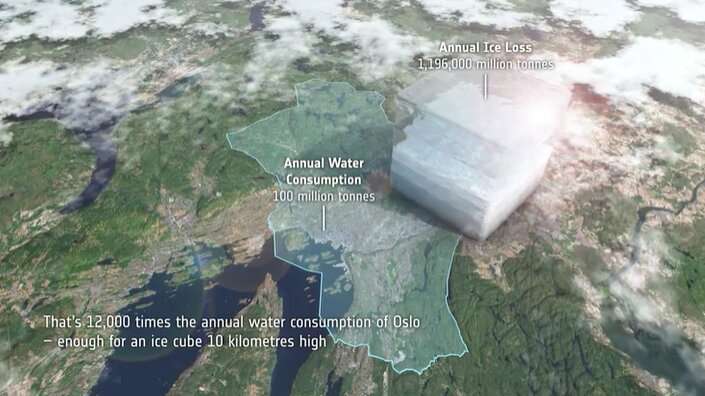Annual global ice loss simulated over Oslo
Satellites play a vital role in monitoring the rapid changes taking place in the Arctic. Tracking ice lost from the world’s glaciers, ice sheets and frozen land shows that Earth is losing ice at an accelerating rate.
Using information from ESA’s ERS, Envisat and CryoSat satellites as well as the Copernicus Sentinel-1 and Sentinel-2 missions, research led by Tom Slater of the University of Leeds, found that the rate at which Earth has lost ice has increased markedly within the past three decades. Currently, more than a trillion tons of ice is lost each year.
To put this into perspective, this is equivalent to an ice cube measuring 10x10x10 km over Oslo’s skyline. Putting it another way, the amount of ice loss globally is equivalent to 12 000 times the annual water use of the Norwegian capital.
The sooner Earth’s temperature is stabilized, the more manageable the impacts of ice loss will be.
Continuity in satellite data is the key to predicting future ice losses, and to assist in mitigating the threats posed by sea-level rise, shrinking high mountain glaciers and further climate feedbacks. The Copernicus Expansion missions, CRISTAL, CIMR and ROSE-L have been designed to fill the gaps in current Sentinel capabilities for comprehensive monitoring of changes in the global ice cover.
Citation:
Video: Annual global ice loss simulated over Oslo (2023, May 23)
retrieved 23 May 2023
from https://phys.org/news/2023-05-video-annual-global-ice-loss.html
This document is subject to copyright. Apart from any fair dealing for the purpose of private study or research, no
part may be reproduced without the written permission. The content is provided for information purposes only.

Satellites play a vital role in monitoring the rapid changes taking place in the Arctic. Tracking ice lost from the world’s glaciers, ice sheets and frozen land shows that Earth is losing ice at an accelerating rate.
Using information from ESA’s ERS, Envisat and CryoSat satellites as well as the Copernicus Sentinel-1 and Sentinel-2 missions, research led by Tom Slater of the University of Leeds, found that the rate at which Earth has lost ice has increased markedly within the past three decades. Currently, more than a trillion tons of ice is lost each year.
To put this into perspective, this is equivalent to an ice cube measuring 10x10x10 km over Oslo’s skyline. Putting it another way, the amount of ice loss globally is equivalent to 12 000 times the annual water use of the Norwegian capital.
The sooner Earth’s temperature is stabilized, the more manageable the impacts of ice loss will be.
Continuity in satellite data is the key to predicting future ice losses, and to assist in mitigating the threats posed by sea-level rise, shrinking high mountain glaciers and further climate feedbacks. The Copernicus Expansion missions, CRISTAL, CIMR and ROSE-L have been designed to fill the gaps in current Sentinel capabilities for comprehensive monitoring of changes in the global ice cover.
Citation:
Video: Annual global ice loss simulated over Oslo (2023, May 23)
retrieved 23 May 2023
from https://phys.org/news/2023-05-video-annual-global-ice-loss.html
This document is subject to copyright. Apart from any fair dealing for the purpose of private study or research, no
part may be reproduced without the written permission. The content is provided for information purposes only.
